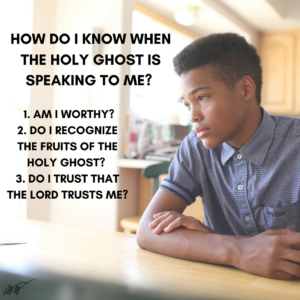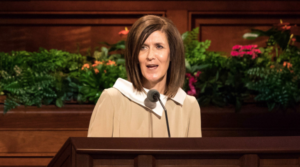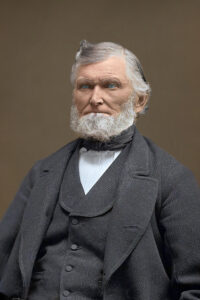Asking Big Questions

With conflicting voices coming at us from all sides, we can find comfort knowing that we have the gift of the Holy Ghost to guide us. As we partake of the sacrament each week, we are promised that we can “always have his Spirit to be with [us]” (Moroni 4:3). What an amazing promise and privilege to be permitted the constant companionship of the Holy Ghost!
Wilford Woodruff counseled,
“Every man should get the Spirit of God and then follow its dictates. This is revelation. It [doesn’t] make any difference what the Spirit tells you to do, it will never tell you to do anything that is wrong.”¹
But sometimes we wonder how we can discern between the voice of the Spirit and our own voice or the voices of others. The Holy Ghost is manifested in different ways to different people at different times. However, in the scriptures it is often described as a “still small voice” (1 Kings 19:12).
 Maybe the stillness or smallness of the voice causes us to wonder if we are hearing it correctly. We often read and hear about dramatic spiritual experiences in which the testimony of the Holy Ghost was unmistakable. I think most of us would appreciate that kind of guidance from time to time, but the Lord asks us to act in faith and listen. We should always seek heavenly guidance and trust that the Spirit will be there, simply because we ask, seek, and knock (see Matthew 7:7).
Maybe the stillness or smallness of the voice causes us to wonder if we are hearing it correctly. We often read and hear about dramatic spiritual experiences in which the testimony of the Holy Ghost was unmistakable. I think most of us would appreciate that kind of guidance from time to time, but the Lord asks us to act in faith and listen. We should always seek heavenly guidance and trust that the Spirit will be there, simply because we ask, seek, and knock (see Matthew 7:7).
After asking, how do we know if the Spirit is speaking to us? First, we can ensure that we are worthy of His guidance; we can then seek to recognize the fruits of the Spirit; and finally, we can trust that God trusts us.
Be Worthy of the Spirit
We can take many actions to remain worthy of the gift of the Holy Ghost. We have been urged by our leaders to keep the commandments, remember our covenants, and live worthy of a temple recommend.
 President Russell M. Nelson recently taught, “The safest place to be spiritually is living inside your temple covenants!”² We live inside our temple covenants when we pray often, study the gospel, partake of the sacrament regularly, and stand in holy places like the temple and our homes. When we are living in this way, we will be closer to God and more aware of His guidance.
President Russell M. Nelson recently taught, “The safest place to be spiritually is living inside your temple covenants!”² We live inside our temple covenants when we pray often, study the gospel, partake of the sacrament regularly, and stand in holy places like the temple and our homes. When we are living in this way, we will be closer to God and more aware of His guidance.
We have also been counseled to take care of our bodies, the temples in which our spirits reside. Elder Richard G. Scott taught, “Exercise, reasonable amounts of sleep, and good eating habits increase our capacity to receive and understand revelation.”³
As we nourish our bodies and spirits and live within our covenants, we can be sure that we are prepared to receive the guidance of the Holy Ghost in our lives.
Know the Fruits of the Spirit
Galatians 5:22–23 says, “But the fruit of the Spirit is love, joy, peace, longsuffering, gentleness, goodness, faith, meekness, temperance: against such there is no law.”4 When we are wondering if something is from the Spirit, we can measure it against these factors. Does it promote peace? Is it good, faithful, humble, and patient? Promptings of the Spirit will never lead to anger or contention.
 Sister Michelle D. Craig shared a reminder to “never suppress a generous thought” in a recent talk. She said, “Sometimes when I have an impression to do something for someone, I wonder if it was a prompting or just my own thoughts. But I am reminded that ‘that which is of God inviteth and enticeth to do good continually; wherefore, every thing which inviteth and enticeth to do good, and to love God, and to serve him, is inspired of God.’ ”
Sister Michelle D. Craig shared a reminder to “never suppress a generous thought” in a recent talk. She said, “Sometimes when I have an impression to do something for someone, I wonder if it was a prompting or just my own thoughts. But I am reminded that ‘that which is of God inviteth and enticeth to do good continually; wherefore, every thing which inviteth and enticeth to do good, and to love God, and to serve him, is inspired of God.’ ”
Elder Bednar encouraged us to move forward with faith, even when we aren’t sure if we are being directed by the Spirit. He said, “In many of the uncertainties and challenges we encounter in our lives, God requires us to do our best, to act and not be acted upon, and to trust in Him. We may not see angels, hear heavenly voices, or receive overwhelming spiritual impressions. We frequently may press forward hoping and praying—but without absolute assurance—that we are acting in accordance with God’s will. But as we honor our covenants and keep the commandments, as we strive ever more consistently to do good and to become better, we can walk with the confidence that God will guide our steps.”5
When we have a good thought or idea, we do not need to wonder if it is from God. The same holds true if we have a bad thought or idea. God will guide us to do good, and we can be assured that good thoughts come from Him. Seek to recognize the good and bad fruits as you make decisions.
Trust That God Trusts You
Sometimes we may wonder if a choice is good, better, best, or right for us at the moment. Even when we are staying worthy of the guidance of the Holy Ghost and focusing on good fruits, we will still have decisions to make.
 Elder Renlund taught, “Personal revelation rightly belongs to individuals. You can receive revelation, for example, about where to live, what career path to follow, or whom to marry. Church leaders may teach doctrine and share inspired counsel, but the responsibility for these decisions rests with you.”6
Elder Renlund taught, “Personal revelation rightly belongs to individuals. You can receive revelation, for example, about where to live, what career path to follow, or whom to marry. Church leaders may teach doctrine and share inspired counsel, but the responsibility for these decisions rests with you.”6
As we choose to live worthily and acknowledge the fruits of the Spirit, we can be sure that God trusts us. As we ask for His guidance, we can trust that He will make His will clear to us, maybe even in ways that we don’t expect or understand right away. Sometimes, He even trusts us to simply make decisions based on our own judgment.
Let the Holy Spirit Guide
 After being baptized as members of The Church of Jesus Christ of Latter-day Saints, we are given the incredible gift of the Holy Ghost. As we use that wonderful gift and stay worthy of it, we can be sure that God will guide us to do what is good.
After being baptized as members of The Church of Jesus Christ of Latter-day Saints, we are given the incredible gift of the Holy Ghost. As we use that wonderful gift and stay worthy of it, we can be sure that God will guide us to do what is good.
Wilford Woodruff taught, “The Lord will work with us, and we should work with him; therefore brethren, let us live by faith, walk by faith, overcome by faith, so that we may enjoy the Holy Spirit to guide and direct us.”7 When we have faith and trust in God, we have the assurance that He will guide us.
The Holy Ghost speaks to each of us in a different way. If you wonder whether you are being guided by the Holy Ghost, consider if you are living worthy of His guidance, look for the fruits of the Spirit, and trust that God trusts you to do good for yourself and for others.
coming soon
Lyndie is working toward a degree in Public Relations at Brigham Young University. Originally from Idaho Falls, Idaho, she enjoys running, spending time with her husband and family, and reading. She was drawn to the Wilford Woodruff Papers out of a desire to learn more about Church history and enjoys being part of the organization’s efforts to touch lives with Wilford Woodruff’s words.
Endnotes
[1] Discourse by Wilford Woodruff, August 10, 1891, p. 3, The Wilford Woodruff Papers, wilfordwoodruffpapers.org/discourse/1891-08-10.
[2] Russell M. Nelson, “The Temple and Your Spiritual Foundation,” Liahona, November 2021, ChurchofJesusChrist.org.
[3] Richard G. Scott, “How to Obtain Revelation and Inspiration for Your Personal Life,” Ensign, May 2012, ChurchofJesusChrist.org.
[4] Michelle D. Craig, “Divine Discontent,” Liahona, November 2018, ChurchofJesusChrist.org.
[5] David A. Bednar, “The Spirit of Revelation,” Liahona, May 2011, ChurchofJesusChrist.org.
[6] Dale G. Renlund, “A Framework for Personal Revelation,” Liahona, November 2022, ChurchofJesusChrist.org.
[7] Discourse by Wilford Woodruff, April 6, 1872, p. 1, The Wilford Woodruff Papers, wilfordwoodruffpapers.org/discourse/1872-04-06.
The Wilford Woodruff Papers Foundation’s mission is to digitally preserve and publish Wilford Woodruff’s eyewitness account of the Restoration of the gospel of Jesus Christ from 1833 to 1898. It seeks to make Wilford Woodruff’s records universally accessible to inspire all people, especially the rising generation, to study and to increase their faith in Jesus Christ. For more information, visit wilfordwoodruffpapers.org.

